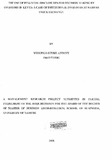| dc.description.abstract | Decision making is the cognitive process leading to the selection of a course of action among
variations. It is a reasoning process which can be rational or irrational. The availability and use of
financial disclosures in decision-making is a contentious issue in Kenya and the world at large.
Several researches have been carried out to that effect, but still there seems to be no answer to
this question. This was evident when the Uchumi Supermarkets, one of the companies listed at
the NSE, despite the release of the financial reports; investors were in the dark concerning the
financial position of the super-store until its financial distress was manifested in the closure of its
branches countrywide and the subsequent deli sting from Nairobi Stock Exchange (NSE). This,
therefore, leads to the question; of what value are financial disclosures to investors in their
decision-making? The objective of the study was to establish the use of financial disclosures by
institutional investors who trade at the Nairobi Stock Exchange.
To satisfy the research objective the researcher used ex-post facto research design comprising a
sample of institutional investors trading at the NSE. The researcher employed a combination of
stratified, convenience and simple random sampling methods to generate the required sample size
of 50 respondents. Primary data was collected using semi-structured questionnaires. The research
assistants dropped the questionnaires at the respondents' offices and collected them within a day
or two. The target respondents were organizations' Chief Executive Officers (CEOs) and
accountants. Once the pertinent data were collected, the researcher carried out analysis of the
same using frequencies, mean scores, percentages, standard deviations, and U test. Where
appropriate, the study results are presented in pie charts and graphs. Computer software SPSS
was used to analyze the data.
The findings of the data analysis revealed that annual reports and published daily share prices
were often used by investors as source of information (mean score 1.7 and 1.6) for investment
decisions. Investors also use information from the managers of the companies, information from
the website, advice from the stockbrokers and friends but on the least scale. The study established
that delays in publication of the disclosures caused serious problem (63%). All the contents of the
financial disclosures are considered important by the institutional investors (mean score < 2.1);
environmental issues are however not ranked high. The findings of the study lead to the
conclusion that majority of the institutional investors use financial disclosures as sources of vital
information for investment decisions. It was observed that, investors have exerted little pressure
to managers and prepares of information for adequate disclosures and that Kenya lacked
comprehensive legal framework to ensure relevant information flow for investment decision
making and investor protection. Investors do not have confidence in financial analysts and
stockbrokers in the use of relevant and reliable financial information. Investment decisions are
complex and require both financial and non-financial information, insight and experience. | en |


